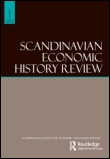
SCANDINAVIAN ECONOMIC HISTORY REVIEW
Scope & Guideline
Bridging Disciplines to Illuminate Economic History
Introduction
Aims and Scopes
- Economic Development and Transformation:
The journal examines the processes of economic change in the Nordic countries, including industrialization, agricultural advancements, and the evolution of market economies. - Social and Economic Inequality:
A consistent focus on income and wealth inequality, the journal investigates historical trends and their impact on social classes and gender roles within Scandinavian societies. - Cultural and Environmental Interactions:
Research often explores how cultural practices and environmental factors influence economic activities, particularly in the context of sustainability and resource management. - Comparative Economic History:
The journal features comparative studies that analyze the economic histories of Nordic countries in relation to other regions, providing insights into unique regional characteristics and shared challenges. - Historical Perspectives on Policy and Governance:
A significant area of interest includes the historical development of economic policies and governance structures, examining how these have shaped contemporary economic landscapes.
Trending and Emerging
- Environmental and Economic Sustainability:
Recent publications highlight the interplay between environmental issues and economic history, focusing on sustainable practices and the economic implications of climate change. - Gender and Economic History:
An increasing number of studies are exploring the intersections of gender and economic roles, examining how gender dynamics have influenced economic developments in the Nordic countries. - Digitalization and Economic Transformation:
There is a growing interest in how digital technologies have transformed economic practices and structures, with researchers investigating historical precedents and future implications. - Globalization and Economic Interdependencies:
Emerging themes focus on the impact of globalization on Nordic economies, exploring historical trade relationships and the economic consequences of global market integration. - Crisis and Resilience in Economic History:
Recent research emphasizes the responses to economic crises, including the analysis of resilience strategies employed by different sectors and regions during periods of economic upheaval.
Declining or Waning
- Traditional Agricultural Studies:
Research centered around pre-industrial agricultural practices and rural economies appears to be waning, with fewer studies addressing these topics in depth compared to previous years. - Narrowly Defined National Histories:
The journal has shifted away from insular studies focused solely on national narratives, favoring broader comparative analyses that incorporate transnational perspectives. - Static Economic Models:
Papers employing static economic models or methodologies that lack historical context are becoming less common, as there is a growing preference for dynamic and contextually rich analyses. - Limited Focus on Non-Nordic Comparisons:
There is a noticeable decline in papers that focus exclusively on comparisons with non-Nordic countries, as researchers increasingly prioritize intra-Nordic comparisons or global perspectives.
Similar Journals

Economic History of Developing Regions
Advancing Understanding of History's Impact on Economic Development.Economic History of Developing Regions, published by Routledge Journals, Taylor & Francis Ltd, is a distinguished academic journal that focuses on the intersection of economic development and historical analysis in emerging economies. Established in 2010, this journal serves as a vital platform for researchers, professionals, and students interested in understanding the economic dynamics and historical contexts that shape developing regions. With its impressive ranking in the Q1 category in History and Q3 in both Development and Economics, it has established itself as a credible source for innovative research and critical insights. Despite being a non-open access publication, it consistently aims to bridge the gap between historical understanding and economic strategies, making it essential reading for those engaged in the studies of economics, history, and development. Emphasizing rigorous academic standards, the journal highlights quality scholarship that contributes to the discourse on sustainable development and policy frameworks essential for evolving economies.

Midland History
Exploring the Rich Tapestry of Midlands HistoryMidland History is a distinguished academic journal, grounded in the rich historical tapestry of the United Kingdom, and published by Routledge Journals, Taylor & Francis Ltd. With an ISSN of 0047-729X and an E-ISSN of 1756-381X, this journal serves as a vital platform for scholarly discourse on various aspects of regional and national history. Although categorized in the Q4 quartile for History in 2023, Midland History is committed to bridging gaps in current historical research and provides a unique opportunity for researchers, professionals, and students to engage with new findings and interpretations. The journal has been published in converged issues spanning from 1971 to 2024, indicating a long-standing commitment to scholarly excellence. Contributions often focus on the social, cultural, and political narratives that shaped the Midlands, making it an important resource for those interested in the intersections of historical practice and contemporary thought. While not currently an open-access journal, Midland History’s contributions are pivotal for fostering a deeper understanding of history within academic circles.

Journal of Belgian History-Revue Belge d Histoire Contemporaine-Belgisch Tijdschrift voor Nieuwste Geschiedenis
Illuminating Belgium's Historical LandscapeThe Journal of Belgian History-Revue Belge d'Histoire Contemporaine-Belgisch Tijdschrift voor Nieuwste Geschiedenis is a prominent academic publication dedicated to the exploration and analysis of contemporary Belgian history. Published by SOMA-CEGES, this journal serves as a vital resource for researchers, professionals, and students alike, providing a platform for scholarly discourse and the dissemination of innovative research in the field. Despite its historical significance, the journal faced a hiatus in its Scopus coverage from 2019, yet it retains a strong identity within the Arts and Humanities category, holding a Scopus rank of #1123 out of 1328, placing it in the 15th percentile. This underscores the opportunities for growth and impactful contributions within the journal's scope. By focusing on the intricacies of Belgian history, the journal encourages rigorous investigation and a deeper understanding of Belgium's past, making it an essential reference for anyone interested in European historical narratives.
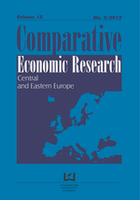
Comparative Economic Research-Central and Eastern Europe
Empowering Economists: Open Access to Critical ResearchComparative Economic Research-Central and Eastern Europe is a distinguished open-access journal published by LODZ UNIV PRESS, dedicated to advancing the field of economics with a focus on comparative studies relevant to Central and Eastern Europe. Since its inception in 2009, the journal has provided a vital platform for disseminating research that explores the unique economic challenges and opportunities faced by this region. With an H-index indicating its contributions to the academic discourse, the journal maintains a Q3 ranking in Economics, Econometrics, and Finance, reflecting the quality and relevance of its published works. This journal is instrumental for researchers, professionals, and students seeking to engage with contemporary economic issues and methodologies, fostering scholarly exchange and innovation. Access to its rich repository of articles is provided freely to promote wider dissemination of knowledge, enabling impactful discussions and policy formulations in the dynamically evolving landscape of the Central and Eastern European economy.
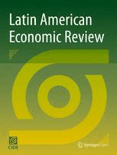
Latin American Economic Review
Navigating Economic Diversity Across Latin AmericaLatin American Economic Review, published by CENTRO INVESTIGACION & DOCENCIA ECONOMICAS-CIDE, is a pioneering open-access journal that has been contributing to the field of economics since its establishment in 2014. With a focus on the diverse economic landscapes of Latin America, it aims to foster a rich dialogue among researchers, policymakers, and practitioners about pressing economic issues and innovative solutions. The journal, which holds an ISSN of 2198-3526 and an E-ISSN of 2196-436X, provides an accessible platform for the dissemination of high-quality research, reflecting a commitment to advancing knowledge in the realms of economics, econometrics, and finance. Though currently positioned in the Q4 category in Economics within Scopus rankings, it continues to evolve, providing valuable insights and fostering collaboration across various disciplines. The journal's open access model enhances its reach, allowing unrestricted availability of content to researchers and practitioners worldwide. As the journal converges through its second decade (2014-2024), it remains dedicated to promoting critical analysis and discussion on economic challenges and policies that affect the region and beyond.
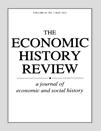
ECONOMIC HISTORY REVIEW
Unraveling Historical Insights for Economic Progress.Economic History Review, published by Wiley, stands as a premier journal in the realms of Economics and Econometrics and History, established in 1927 and converging its reach through 2024. With an impressive impact factor reflected in its tier placements—Q1 in both Economics and History categories as of 2023—this journal provides critical insights and comprehensive analyses that advance understanding of economic historical developments. It is recognized in the Scopus Rankings with notable standings in the Arts and Humanities (Rank #25/1760) and Economics (Rank #259/716), placing it in the top percentiles in these fields. Although not an open access journal, it offers various subscription options, ensuring a broad dissemination of valuable research. The Economic History Review appeals to a diverse audience including researchers, professionals, and students eager to explore the intricate relationships between economic phenomena and historical contexts.
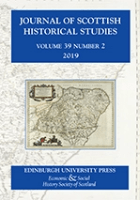
Journal of Scottish Historical Studies
Fostering Scholarly Exchange on Scottish NarrativesThe Journal of Scottish Historical Studies, published by Edinburgh University Press, is a vital resource for academics and practitioners interested in the nuanced history and cultural dynamics of Scotland. Established in 1996, this journal serves as a platform for rigorous research across several disciplines, including Anthropology, Cultural Studies, Economics, and History, making significant contributions to scholarly discourse in each area. Although it currently holds a Q4 ranking in several categories for 2023, its placement reflects the burgeoning interest and potential for impactful contributions within these fields. Researchers and students will find valuable insights and discussions that not only highlight Scottish historical perspectives but also connect broader themes within the humanities and social sciences. With an ISSN of 1748-538X and an E-ISSN of 1755-1749, the journal is committed to fostering scholarly exchange and advancing knowledge within its scope. The journal's accessibility outside of traditional subscription models continues to evolve, allowing for a wider dissemination of its rich content.
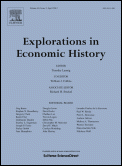
EXPLORATIONS IN ECONOMIC HISTORY
Exploring the Interplay of Economics and HistoryExplorations in Economic History, published by Academic Press Inc Elsevier Science, is a prestigious journal that has significantly contributed to the fields of Economics and History since its inception in 1969. With its ISSN 0014-4983 and E-ISSN 1090-2457, this journal has maintained a solid reputation, underscored by its impressive ranking in the Q1 quartile for both Economics and Econometrics and History as of 2023. It serves as an essential platform for researchers, professionals, and students who are keen on unveiling the economic dimensions of historical events and contexts. The journal is indexed in Scopus, attaining a ranking of 61 out of 1760 in Arts and Humanities (History) and 354 out of 716 in Economics, reflecting its significant impact in the academic community. Despite not being an open-access journal, its critical analyses and comprehensive studies provide invaluable insights into the economic phenomena of the past, fostering a deeper understanding of contemporary economic challenges. With committed publication until 2024, this journal continues to be a vital resource for those striving to explore the intricate intersections of history and economics.
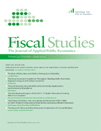
FISCAL STUDIES
Driving innovation in economic research.FISCAL STUDIES, published by WILEY, is a prestigious journal focused on the intricate dynamics of finance, economics, and accounting. With a history of excellence dating back to 1979, this journal has established itself as a leading publication, boasting an impressive impact factor and ranking in the top quartile across multiple categories: Q1 in Accounting, Q1 in Economics and Econometrics, and Q1 in Finance for 2023. As evidenced by its Scopus rankings—3rd in Accounting, 9th in Finance, and 23rd in Economics—this journal is an invaluable resource for researchers, professionals, and students pursuing in-depth knowledge in these fields. While it currently does not offer open access options, its comprehensive editorial scope ensures rigorous peer-reviewed articles that contribute significantly to fiscal discourse and policy development. Engage with FISCAL STUDIES to explore groundbreaking research and advancements in understanding financial systems and economic strategies.

CHINA ECONOMIC REVIEW
Bridging Research and Policy in China’s Economic SphereChina Economic Review, published by Elsevier Science Inc, stands as a leading academic journal dedicated to the rigorous exploration of economic and financial issues pertinent to China and its place in the global economy. Established in 1989, this journal has built a robust reputation over the years, achieving a prestigious Q1 ranking in both Economics and Econometrics and Finance as of 2023. With a Scopus rank placing it in the top 93rd percentile for both categories, the journal serves as a vital resource for researchers, policymakers, and students alike, facilitating a deeper understanding of China’s economic dynamics. Although not an Open Access publication, articles are rigorously peer-reviewed, ensuring high-quality contributions that advance the field. With the scope covering a diverse range of topics, from market trends to fiscal policies, China Economic Review remains essential for those looking to engage with cutting-edge research and insights into one of the world's largest economies.